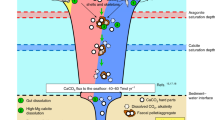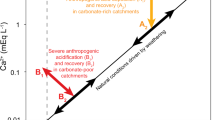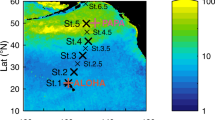Abstract
RECENTLY, Wells and Illing have suggested1 that the so-called ‘whitings’ in the Persian Gulf are clouds of calcium carbonate precipitated instantaneously from sea-water that has become supersaturated with respect to calcium carbonate, owing to removal of CO2 by the photosynthetic action of phytoplankton.
This is a preview of subscription content, access via your institution
Access options
Subscribe to this journal
Receive 51 print issues and online access
$199.00 per year
only $3.90 per issue
Buy this article
- Purchase on Springer Link
- Instant access to full article PDF
Prices may be subject to local taxes which are calculated during checkout
Similar content being viewed by others
References
Wells, A. J., and Illing, L. V., in Developments in Sedimentology, 1, 429, edit. by L. M. J. U. van Straaten (Amsterdam, 1964).
Simkiss, K., Nature, 201, 492 (1964).
Author information
Authors and Affiliations
Rights and permissions
About this article
Cite this article
DE GROOT, K. Inorganic Precipitation of Calcium Carbonate from Sea-water. Nature 207, 404–405 (1965). https://doi.org/10.1038/207404a0
Issue Date:
DOI: https://doi.org/10.1038/207404a0
This article is cited by
-
Lime muds and their genesis off-Northwestern India during the late Quaternary
Journal of Earth System Science (2012)
-
Whiting-related sediment export along the Middle Miocene carbonate ramp of Great Bahama Bank
International Journal of Earth Sciences (2011)
-
Geochemical study of lime-mud borings and associated coral-reef limestones in the intertidal flat of Kondoi Beach, Taketomi Island, Okinawa, Japan
Carbonates and Evaporites (2002)
-
Precipitation of Metastable Carbonate Phases from Seawater
Nature (1970)
-
Crystal Form of Precipitated Calcium Carbonate as influenced by Adsorbed Magnesium Ions
Nature (1966)
Comments
By submitting a comment you agree to abide by our Terms and Community Guidelines. If you find something abusive or that does not comply with our terms or guidelines please flag it as inappropriate.



